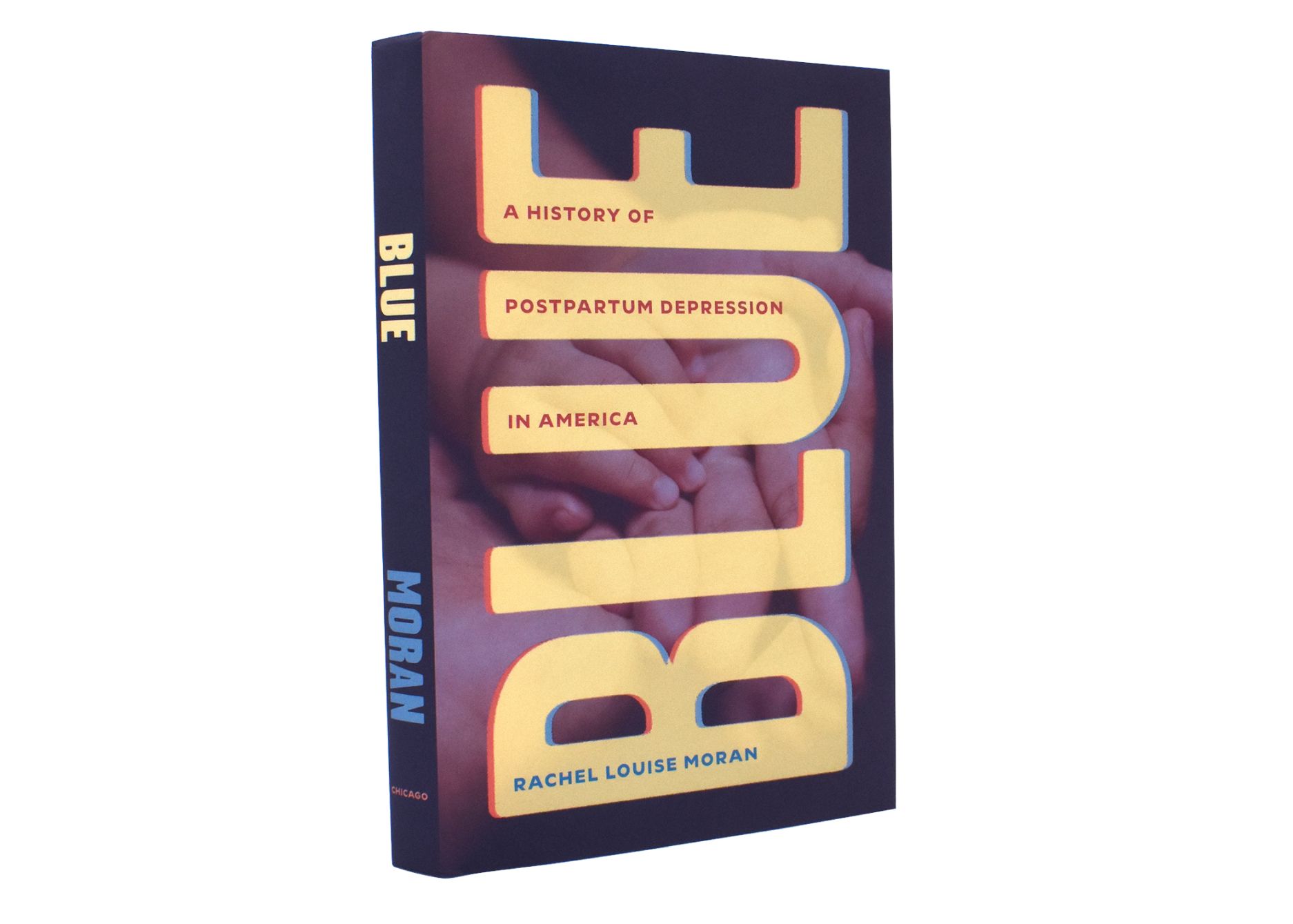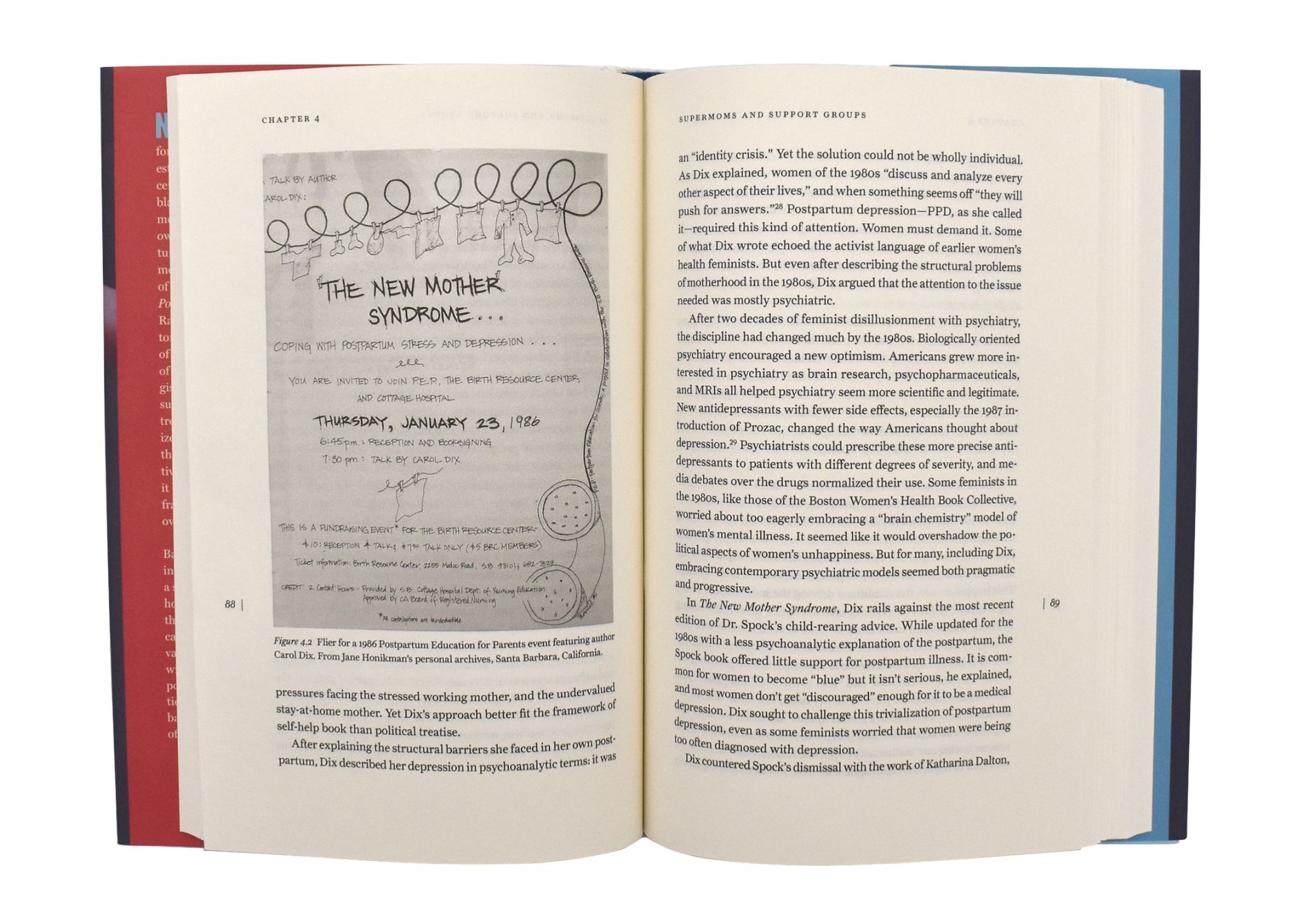Blue
A History of Postpartum Depression in America
New motherhood is often seen as a joyful moment in a woman’s life; for some women, it is also their lowest moment. For much of the twentieth century, popular and medical voices blamed women who had emotional and mental distress after childbirth for their own suffering. By the end of the century, though, women with postpartum mental illnesses sought to take charge of this narrative. In Blue: A History of Postpartum Depression in America, Rachel Louise Moran explores the history of the naming and mainstreaming of postpartum depression. Coalitions of maverick psychiatrists, psychologists, and women who themselves had survived substantial postpartum distress fought to legitimize and normalize women’s experiences. They argued that postpartum depression is an objective and real illness and fought to avoid it being politicized alongside other fraught medical and political battles over women’s health.
Based on insightful oral histories and in-depth archival research, Blue reveals a secret history of American motherhood, women’s political activism, and the rise of postpartum depression advocacy amid an often-censorious conservative culture. By breaking new ground with the first book-length history of postpartum mental illness in the twentieth century, Moran brings mothers’ battles with postpartum depression out of the shadows and into the light.
304 pages | 12 halftones | 6 x 9 | © 2024
History: American History
Women's Studies:
Reviews
Table of Contents
1. Baby Blues and the Baby Boom
2. A Feminist Postpartum
3. Psychiatric Foundations
4. Supermoms and Support Groups
5. A Different Kind of Women’s Health Movement
6. The Problem of Diagnosis
7. The Postpartum Professional
8. Talk Shows, Tell-Alls, and Postpartum Awareness
9. A New Generation of Activism
10. It Is Not a Political Issue
Conclusion
Acknowledgments
Notes
Index
Excerpt
In December 1983, Nancy Berchtold gave birth. It was a long birth; the New Jersey teacher pushed for two and a half excruciating hours. After delivering her daughter, Berchtold began hemorrhaging. For hours, no one at the hospital noticed the extent of her blood loss. While she was eventually treated, they did not give her a transfusion because of fears of hepatitis in the blood supply. Berchtold was weak and anemic when she, her husband, and their newborn drove home.
Things got bad quickly. Berchtold explained that overnight she had “turned into Supermom.” This was not the “supermom” debated in the magazines of the 1980s, though. This was an extended manic episode. She was up all night nursing, cleaning, cooking, and decorating the Christmas tree. She could not stop to sleep and couldn’t slow her racing thoughts. Every airplane she heard overhead might be about to drop a nuclear bomb. She called friends to ask strange questions: How do I find the missing puzzle piece? She had no appetite. Her husband and mother worried, but they also did not know how to think about the situation. Was it just a “baby blues” phase that would pass, or was it more serious? When her husband returned to work, her situation worsened. Her husband ultimately called the obstetrician, who directed her to the hospital. They admitted her for psychosis.
Berchtold’s hospitalization was a blur. The hospital did not allow her to see her daughter. While Berchtold was confident that she had not harmed her daughter, the lack of visitation convinced her that her daughter was dead. Antipsychotic medication helped her, and when discharged she went to stay with her parents for extra support and supervision. After her recovery from psychosis, Berchtold became depressed. “I remember waking up at one point . . . there would be a bird chirping, and the sun would be rising, and I’d be like ugh, I didn’t want the day to come.” She credits psychiatric intervention, antidepressants, and daily visits from her mother-in-law for helping her through both illnesses. Berchtold describes those illnesses as postpartum psychosis and a clinical depression that was similar to postpartum depression.
Berchtold subsequently sought other kinds of support and community. She had the benefit of a supportive family but didn’t know any other women who had been through what she had. She knew how rare postpartum psychosis was—estimated at one in a thousand births—and believed no one could fully understand. Still, she believed she could find other new mothers who wanted to talk about their (non-psychotic) struggles. When her daughter was five or six months old, she drove to Princeton, New Jersey, to attend a moms’ group at the Family Resource Center. Berchtold never shared her full experience with the group; she believed the psychosis would horrify them. Still, the meetings were “like heaven on earth” to her. Discussing topics like returning to work and mixed emotions about breastfeeding invigorated her. Berchtold made one friend in the group who privately admitted her own severe postpartum depression. After a bit, Berchtold had an idea: a new mothers’ group specifically for women like them to talk openly about postpartum mental illness.
Women like Berchtold developed support groups for postpartum mental illness in the 1980s, and the networks of these groups made up a social movement by the end of the decade. The most prominent ones in the US were Nancy Berchtold’s Depression After Delivery (DAD) and Jane Honikman’s second organization, Postpartum Support International (PSI). After Berchtold founded DAD, other women launched chapters around the country. Honikman began PSI to organize postpartum professionals and support groups, built on her experience with Postpartum Education for Parents. DAD existed independently for over 20 years, while PSI still exists today, with volunteers in every state, online and in-person support groups, and a toll-free helpline.
It is difficult to overstate the role these two groups played in establishing the contemporary landscape of postpartum depression in the US. As we’ve seen, in the 1980s motherhood was aggressively political. But these postpartum mental health groups sought to create a less polarizing political space. Although the women’s health movement and 1970s feminism were substantial influences on DAD and PSI, postpartum activists of the 1980s saw their project differently; they tended not to question motherhood, psychiatry, and obstetrics. DAD and PSI aimed to include stay-at-home and working mothers and carefully danced around judging either. They almost never took a partisan political stance. Instead, postpartum activists centered on raising awareness about postpartum depression. They adopted the consumer orientation that was slowly taking over other mental illness activism, whose reformist efforts fit well with the middle-class, private insurance orientation of those at the helm of the movement. They married grassroots resources and support group settings with psychiatric alliances and approaches. This was a serious women’s health movement, but one with a distinctively 1980s politics.
As she expanded DAD, people often told Berchtold about what a difference the organization had made for them and their families. That became “another reason to just keep going and going.” Even as the organization grew, Berchtold kept her day job as a teacher. “I was never paid as director,” she explained. “I was never paid as president. Never. I just wouldn’t have done that.” In the early years, a mix of adrenaline and that care-driven passion fueled Berchtold and DAD. The group organically expanded to not only include a support group but also to take on advocacy work. They offered meetings and made information about postpartum mental health available to anyone who requested it. They scrounged up funds for photocopies and stamps. Berchtold’s mother-in-law was an accountant who helped them track donations and expenditures. Volunteers stuffed envelopes. Berchtold described it as “grassroots” and then corrected herself. “There’s a better word than grassroots. It’s just like this community,” she explained. These women “survived this and were just so intent on helping others and making sure that women survived this, that babies survived this, that families survived this. It was just that kind of passion.”
DAD leadership never understood being grassroots or passionate as at odds with a medical model of postpartum depression. Even before the first meeting, Berchtold sought a medical advisor. Many of the first members were “severely impaired women” processing serious postpartum problems, and Berchtold wanted to be sure she was okay from a legal perspective. She met Dr. Ricardo Fernandez through a friend of her husband, but he said he knew very little about postpartum mental illness. There had only been one paragraph on the subject in his main psychiatry textbook, he explained. The fact that he admitted his ignorance, and his willingness to learn, pleased Berchtold. Fernandez became an expert at the same time he began advising DAD. Postpartum depression also became one of his private practice specialties. Berchtold and Fernandez were “a team” for 10 years. Fernandez’s medical degree and medical explanations complemented Berchtold’s message of care. As a male psychiatrist—even one freshly self-taught on postpartum disorders—he offered authority and, critically, legitimacy to DAD.
By 1989, there were 52 DAD chapters nationwide. While all coordinated with DAD national in New Jersey, each also had its own goals and approach to postpartum. Most chapters drew on hormonal explanations of postpartum illness and framed these explanations as critical to helping women feel better about their postpartum experience. In an interview about the Utah chapter, Berchtold explained how “women were reassured that their depression results not from some weakness of will or from their inadequacies as a mother, but from the hormonal changes that come with childbirth.” To Berchtold, the hormonal explanation was liberating. Women should not feel guilty or weak, and they are not responsible for their depression. Still, Berchtold explained, “We’re getting resistance from the women’s movement because we say it’s hormonal.” Most postpartum activists embraced a hormonal or related biological cause as the primary explanation of postpartum illness by the late 1980s, but this embrace was not uncomplicated.
Awards
American Association for the History of Medicine: George Rosen Prize
Shortlist
American Association for the History of Medicine: William H. Welch Medal
Shortlist



